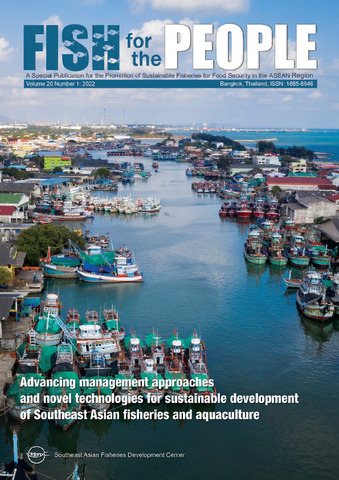Fish for the People Vol. 20 No. 1
Share
ບົດຄັດຫຍໍ້
Fisheries have been playing important roles in the socioeconomic structure of many countries in the world, especially in Southeast Asia. In addition to supplying the source of protein for many, fisheries have always played a fundamental part in enhancing the world economies and providing job opportunities to a lot of people, making it critical for the sustainable management of the fisheries for the future generations.
In the Southeast Asian region, the need to enhance the integration of habitat and biodiversity conservation into fishery management and practices has been realized through the establishment of fisheries refugia, which is considered an important approach for the conservation and management of major critical coastal habitats including mangroves, coral reefs, and seagrass beds. The countries in the region recognized that a comprehensive structural framework, criteria, and indicators are essential components of effective
fisheries refugia to manage the intense levels of small-scale fishing pressures that exert unsustainable pressure on the fisheries and the environment. Specifically, indicators that reflect broad ecological, social, economic, and institutional objectives could provide supplementary information to improve sustainable fisheries management and formulate fishery management policies and frameworks.
For aquaculture, technologies are continued to be developed to enhance the reproduction of economically important cultured penaeid species as well as recuperate threatened fish species. However, slow growth, diseases, and low reproduction are among the challenges in closing the life cycle in captivity and domesticating shrimp; thus, novel strategies are being explored to manipulate sex-specific nutritional requirements and enhance the maturation and mating of male and female broodstock. Meanwhile, experimental farming of threatened freshwater fish revealed unfeasible results due to slow growth, predatory behavior, and high feed requirement; nevertheless, research on broodstock rearing, spawning, and hatching is underway to support conservation efforts.
Due to COVID-19, the government-imposed lockdowns made negative and positive impacts on the fisheries sector of major fishing countries of the region. Although the closure harmed the ecotourism industry, the local people have found sustainable ways to survive through the crisis such as returning to fishing and farming while not abandoning their environmental conservation initiatives. Measures have also restricted trade which led to a decline in demand for fish and fishery products. On the other hand, lockdowns did not stop illegal fishing, particularly encroachment of commercial fishing in areas that are restricted to small-scale fishing.
Nonetheless, the countries remained vigilant to apprehend illegal fishing practices by sustaining the enforcement activities despite COVID-19 restrictions.
Recently, the use of information technologies had been strengthened to include not only monitoring and tracking the activities of fishing vessels but also monitoring, managing, and warning of any environmental problems in coastal areas. The technologies are also being used for mobile catch documentation applications for small-scale fish suppliers and buyers, and also serve as communication devices, enabling small-scale fishers to participate in electronic catch documentation traceability and establish increased communication and safety at sea. These technologies are therefore potential tools for utilization in data and information
compilation and various analyses, the results of which could be used in decision making and in formulating management strategies for sustainable utilization of fishery resources.

